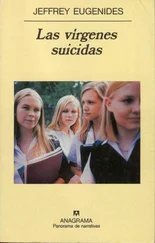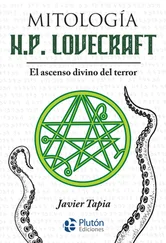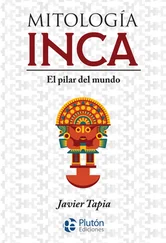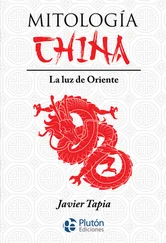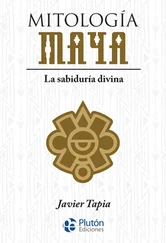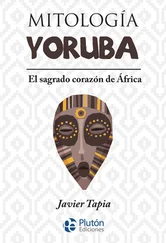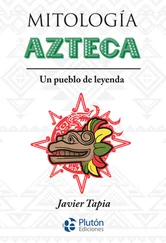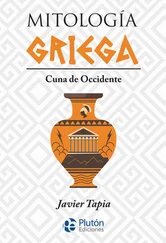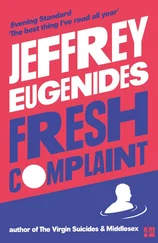And so: Assumption Church that July morning. Incense rising with the pungency of irrational hope. Closer in (it had been drizzling out), the smell of wet wool. The dripping of umbrellas stashed under pews. The rivulets from these umbrellas flowing down the uneven floor of our poorly built church, pooling in spots. The smell of hairspray and perfume, of cheap cigars, and the slow ticking of watches. The grumbling of more and more stomachs. And the yawning. The nodding off and the snoring and the being elbowed awake.
Our liturgy, endless; my own body immune to the laws of time. And right in front of me, Zoë Antoniou, on whom time had also been doing a number.
The life of a priest’s wife had been even worse than Aunt Zo had expected. She had hated her years in the Peloponnese. They had lived in a small, unheated stone house. Outside, the village women spread blankets under olive trees, beating the branches until the olives fell. “Can’t they stop that damn racket!” Zoë had complained. In five years, to the incessant sound of trees being clubbed to death, she bore four children. She sent letters to my mother detailing her hardships: no washing machine, no car, no television, a backyard full of boulders and goats. She signed her letters, “St. Zoë, Church martyr.”
Father Mike had liked Greece better. His years there represented the best period of his priesthood. In that tiny Peloponnesian village the old superstitions survived. People still believed in the evil eye. Nobody pitied him for being a priest, whereas later on in America his parishioners always treated him with a slight but unmistakable condescension, like a crazy person whose delusions had to be humored. The humiliation of being a priest in a market economy didn’t plague Father Mike while he was in Greece. In Greece he could forget about my mother, who had jilted him, and he could escape comparison with my father, who made so much more money. His wife’s nagging complaints hadn’t begun to make Father Mike think about leaving the priesthood yet, and hadn’t led him to his desperate act . . .
In 1956 Father Mike was reappointed stateside to a church in Cleveland. In 1958 he became a priest at Assumption. Zoë was happy to be back home, but she never got used to her position as presvytera . She didn’t like being a role model. She found it difficult to keep her children looking neat and well dressed. “On what money?” she shouted at her husband. “Maybe if they paid you halfway decent the kids would look better.” My cousins—Aristotle, Socrates, Cleopatra, and Plato—had the thwarted, overbrushed look of ministers’ children. The boys wore cheap, garishly colored double-breasted suits. They had Afros. Cleo, who was as beautiful and almond-eyed as her namesake, made do with dresses from Montgomery Ward. She rarely spoke, and played cat’s cradle with Plato during the service.
I always liked Aunt Zo. I liked her big, grandstanding voice. I liked her sense of humor. She was louder than most men; she could make my mother laugh like nobody else.
That Sunday, for instance, during one of the many lulls, Aunt Zo turned around and dared to joke. “I have to be here, Tessie. What’s your excuse?”
“Callie and I just felt like coming to church,” my mother answered.
Plato, who was small like his father, sang out with mock censure, “Shame on you, Callie. What did you do?” He rubbed his right index finger repeatedly over his left.
“Nothing,” I said.
“Hey, Soc,” Plato whispered to his brother. “Is cousin Callie blushing?”
“She must have done something she doesn’t want to tell us.”
“Shush up now, you,” said Aunt Zo. For Father Mike was approaching with the censer. My cousins turned around. My mother bowed her head to pray. I did, too. Tessie prayed for Chapter Eleven to come to his senses. And me? That’s easy. I prayed for my period to come. I prayed to receive the womanly stigmata.
Summer sped on. Milton brought our suitcases up from the basement and told my mother and me to start packing. I tanned with the Object at the Little Club. Dr. Bauer haunted my mind, judging the proportions of my legs. The appointment was a week away, then half a week, then two days . . .
And so we come to the preceding Saturday night, July 20, 1974. A night full of departures and secret plans. In the early hours of Sunday morning (which was still Saturday night back in Michigan), Turkish jets took off from bases on the mainland. They headed southeast over the Mediterranean Sea toward the island of Cyprus. In the ancient myths, gods favoring mortals often hid them away. Aphrodite blotted out Paris once, saving him from certain death at the hands of Menelaus. She wrapped Aeneas in a coat to sneak him off the battlefield. Likewise, as the Turkish jets roared over the sea, they were also hidden. That night, Cypriot military personnel reported a mysterious malfunctioning of their radar screens. The screens filled with thousands of white blips: an electromagnetic cloud. Invisible inside this, the Turkish jets reached the island and began dropping their bombs.
Meanwhile, back in Grosse Pointe, Fred and Phyllis Mooney were also leaving home base, heading to Chicago. On the front porch, waving goodbye, stood their children, Woody and Jane, who had secret plans of their own. Flying toward the Mooneys’ house at that moment were the silver bombers of beer kegs and the tight formations of six-packs. Cars full of teenagers were on their way. And so were the Object and I. Powdered and glossed, our hair hot-combed into wings, we had set off for the party ourselves. In thin corduroy skirts and clogs we came up the front lawn. But the Object stopped me on the porch before we went in. She was biting her lip.
“You’re my best friend, right?”
“Right.”
“Okay. Sometimes I think I have bad breath.” She stopped. “The thing is, you can never tell if you have bad breath or not. So the thing is”—she paused—“I want you to check it for me.”
I didn’t know what to say and so said nothing.
“Is that too disgusting?”
“No,” I said, finally.
“Okay, here goes.” She leaned toward me and huffed a single breath into my face.
“It’s okay,” I said.
“Good. Now you.”
I leaned down and exhaled in her face.
“It’s fine,” she said, decisively. “Okay. Now we can go to the party.”
I’d never been to a party before. I felt for the parents. As we squeezed by the throngs in the throbbing house, I cringed at the destruction under way. Cigarette ashes were dropping on Pierre Deux upholstery. Beer cans were spilling onto heirloom carpets. In the den I saw two laughing boys urinating into a tennis trophy. It was mostly older kids. A few couples climbed the stairs, disappearing into bedrooms.
The Object was trying to act older herself. She was copying the superior, bored expressions of the high school girls. She crossed to the back porch ahead of me and got in the line for the keg.
“What are you doing?” I asked.
“I’m getting a beer. What do you think?”
It was fairly dark outside. As in most social situations, I let my hair fall into my face. I was standing behind the Object, looking like Cousin It, when someone put his hands over my eyes.
“Guess who?”
“Jerome.”
I pulled his hands off my face and turned around.
“How did you know it was me?”
“The curious smell.”
“Ouch,” said a voice behind Jerome. I looked over and received a shock. Standing with Jerome was Rex Reese, the guy who had driven Carol Henkel to her watery death. Rex Reese, our local Teddy Kennedy. He didn’t look particularly sober now, either. His dark hair covered his ears and he wore a piece of blue coral on a leather thong around his throat. I searched his face for signs of remorse or repentance. Rex wasn’t searching my face, however. He was eyeing the Object, his hair falling into his eyes above the curl of a smile.
Читать дальше
Конец ознакомительного отрывка
Купить книгу

